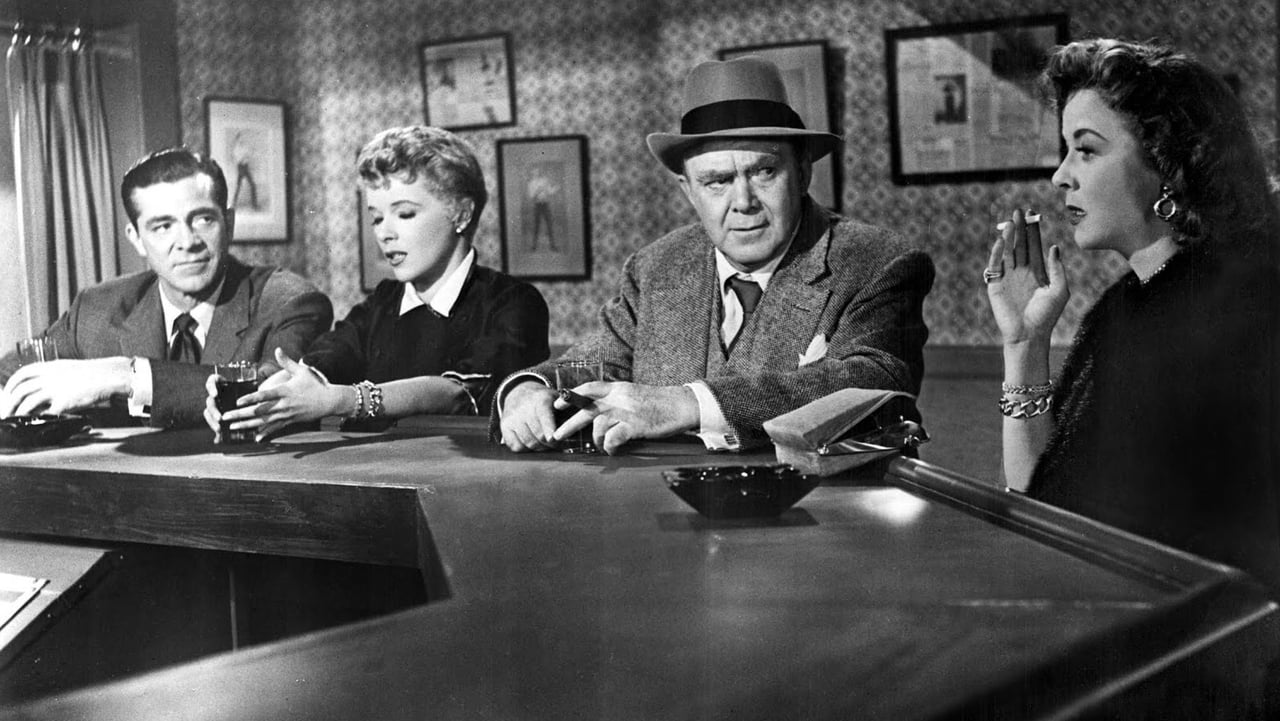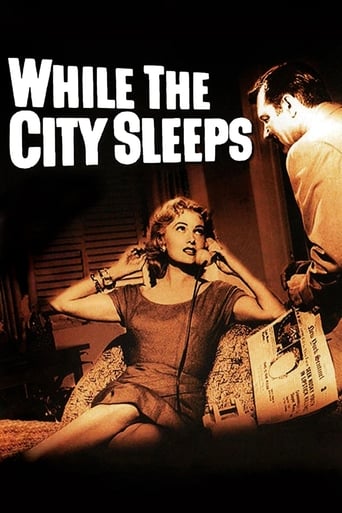Konterr
Brilliant and touching
Doomtomylo
a film so unique, intoxicating and bizarre that it not only demands another viewing, but is also forgivable as a satirical comedy where the jokes eventually take the back seat.
Leoni Haney
Yes, absolutely, there is fun to be had, as well as many, many things to go boom, all amid an atmospheric urban jungle.
Hayleigh Joseph
This is ultimately a movie about the very bad things that can happen when we don't address our unease, when we just try to brush it off, whether that's to fit in or to preserve our self-image.
jc-osms
Not one of the great Fritz Lang's greatest, "While The City Sleeps" despite its great Film Noir title never really wakens itself up. It has its moments but with a confusing plot-line, some confused casting and acting to go with it, it was something of a disappointment to this long-term Lang fan.It starts well enough with the shocking murder of a young girl in her apartment, although too soon we're shown who the murderer is, a young Elvis lookalike and given the usual Freudian explanations - father left when he was young, mother wanted a girl instead of a boy - for his crimes. Hitchcock of course treated the subject of a mother-fixated psychopath just a bit better a few years later and I would doubt he learned much from his great contemporary's earlier take on the subject.Mixed in with this is a weird background story of three prominent newspaper staff members set against each other for the top job on the paper by a miscast Vincent Price as the heir to the paper's owner who conveniently dies barely minutes into the film. The late mogul's preferred choice to take over the reins is crusading Pulitzer Prize winning author and now occasional reporter and TV broadcaster, Dana Andrews, whose character appears more often drunk than sober and who has an unattractively off-hand way with his adoring girlfriend, at one point offering her as bait for the killer without even asking her. To be fair, this race to the top amongst the three contenders holds almost no viewer interest and only detracts from the main plot. Throw in Ida Lupino as an on-the-make female reporter, content to seduce Andrews at the behest of her equally miscast editor boss George Sanders, Rhonda Fleming as Price's philandering wife and Sally Forrest, with a trendy boy-ish hair cut as Andrews' too young now-she-loves-him, now-she-doesn't girlfriend and there really are too many cooks spoiling this particular pot-boiler.There are also several scenes which are just plain odd, like when Lupino's character attempts to beguile Andrews by using an old-fashioned, supposedly salacious spectrograph which turns out to contains an image of a swaddling baby or when Price, in a natty pair of shorts practises his putting while in conversation with his statuesque wife who is striking poses in her beach-wear. The film really had no attractive characters and the female characters in particular are poorly written. There is a noticeably adult approach to the filming of the loosely-termed love scenes (one especially where an adulterous conversation is played out with a bed prominently in the background) and the final attack on Price's wife is noticeably realistic, but this film lacks the imaginative flair of director Lang's best work and ranks as one of his few failures in my book.
TheLittleSongbird
I don't think that While the City Sleeps is among Fritz Lang's best, like M or Metropolis. However, despite a rather tepid final chase sequence and Rhonda Fleming coming across as rather bland, it is an interesting film. It looks good, with the cinematography excellent even in the final chase, and the score has some hauntingly atmospheric themes. The dialogue is arch and sharp, with a cynical yet involving tone, and the story even in the more talky moments, and there are many of those, is compelling with some tension. Lang's direction is accomplished as are the cast. Dana Andrews is solid in the lead, while Ida Lupino oozes sex appeal and Vincent Price is wonderfully snide and unprincipled. George Sanders brings an oily if not exactly subtle nature to his role, Thomas Mitchell is again memorable and there is also a menacing performance from John Barrymore. Overall, a solid and interesting film, though not the best work that everybody here has done. 8/10 Bethany Cox
Michael Neumann
Fritz Lang's personal favorite of all his films is, unfortunately, not his best, but he adds a cynical twist to the familiar story of a psychopath pursued by a headline-hungry press by showing more sympathy for the Freudian torments of the killer than for the scheming newsmen out to apprehend him. No one is completely innocent, least of all the supposedly white-hatted journalists, who would rather compete for personal kudos than bring a serial killer to justice: sharks in a feeding frenzy exhibit better ethics. Goodness prevails, in the guise of square-jawed hero Dana Andrews, but the film is sparked more by the presence of Vincent Price as the Machiavellian, milquetoast media tycoon who exploits 'the lipstick murders', and by Ida Lupino as a gossip column queen willing to sell her soul to the highest bidder. The actress couldn't have had much choice about her role: in film noir women were usually relegated to playing good girls or tough cookies, and the former position was already filled.
jotix100
Fritz Lang's Hollywood career was almost ending in 1956. His choice to direct this film will baffle anyone that has followed the master's career from his early days in Germany. The picture marked almost the end of his involvement in the American cinema for he only directed "Beyond a Reasonable Doubt" after this one, then left for Germany.The film combines two subjects that were close to Mr. Lang's heart, crime, and the way he perceived the empowerment of the news media in the country. We suspect the inspiration for this film might have been CBS, one of the most powerful networks in the land, and his star correspondent, Edward R. Morrow, a figure that might have influenced his own take on Edward Mobley, the television newscaster that is the clear favorite of the founder of the empire, Amos Kyne.The film combines the newspaper drama with that of a serial killer, an event that occupies the front page and the leading piece in Mobley's telecast. As Amos Kyne dies, there is a power struggle trying to be selected as the successor to the founder. The weak son of the late Amos Kyne, Walter, is the one to call the shots, as whom will be in charge of the media corporation, while the killer gets involved in the story in curious ways.The film gathered enough talent to make it commercially viable. Dana Andrews, with his good looks, was the perfect choice to play Mobley. The ensemble cast was wonderful because it brought together George Sanders, Thomas Mitchell, Ida Lupino, Vincent Price, Rhonda Fleming, and the menacing John Drew Barrymore Jr. to give the director a satisfying film.The only puzzling sequence involves a supposedly subway chase with a Los Angeles setting, something that clearly did not make much sense for those that realized the conflict of sites.

